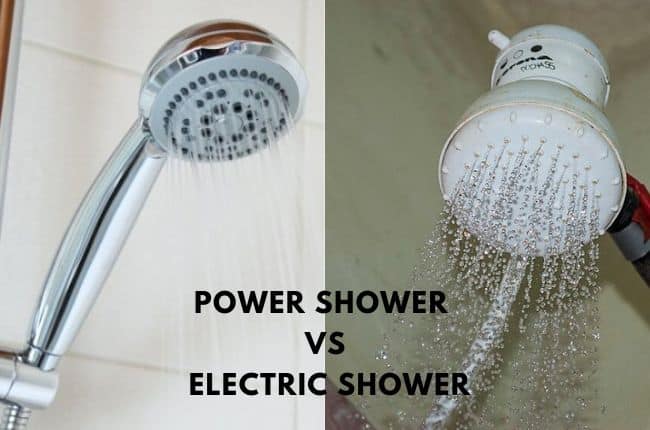Do you feel like it’s time to get a new shower for your bathroom? The world of bathroom installations can be a confusing jargon-filled one. Let’s break that down and walk you through the crucial differences between power showers and electric showers.

Power showers
You’re probably already familiar with a mixer shower, the type that combines hot and cold water. Well, a power shower does all that plus a bit more. In addition, your power shower will boost water pressure with a handy shower pump. This keeps the flow of water consistent.
And thanks to a separate hot water storage cylinder that most other showers do not have, the water should be warm from the moment you switch this shower on.
The power shower could be the most refreshing showering experience there is.If you’re considering one, you should be aware that they are not compatible with combi boilers or pressurised systems.
They are not usually very eco-friendly, either, when compared with other types of showers. Taking a ten-minute power shower uses a similar amount of power as a medium-sized bath.
But if your priority is luxury and your budget is generous, you may be very happy with a power shower installation.
Electric showers
An electric shower is an ideal solution for the busy nine-to-fiver who doesn’t want to wait for the water to heat up. Electricity heats the water in an instant, and then it will stay hot for the full duration of your shower.
It doesn’t interfere with taps or household appliances that use water from the boiler, because it’s operating on a different system! This means it’s often a good choice for large households where there are constantly people using the kitchen and other bathrooms.
But again, the electric shower isn’t compatible with every single home. The mains must have a minimum pressure of 1 bar (the requirement may be higher for a shower with a higher wattage, and your water must flow at a rate of at least 8 litres per minute. There will also need to be a maximum static pressure of 10 bar.
The main drawback of the electric shower can be its pressure. This is often weaker than that of other types, so if a strong water flow is important to you, look for a higher wattage. The higher it is, the better the pressure.
Which one is better for you?
Good water pressure and manageable energy bills are a bit of a balancing act. If energy efficiency is a concern, it might be safer to choose an electric shower. They don’t need as much power to heat water and often come complete with an energy efficiency button.
If this isn’t a concern though and you’re more focused on a luxurious showering experience, a power shower may be the way forward. If low water pressure is a noticeable problem on your property, this could also be an incentive for installing a power shower.
Whichever you choose, make sure you know what’s going to work best for you and your home first!

